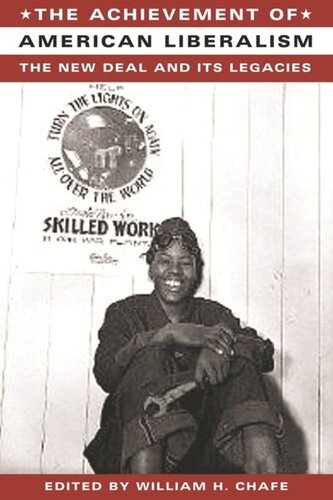

Most ebook files are in PDF format, so you can easily read them using various software such as Foxit Reader or directly on the Google Chrome browser.
Some ebook files are released by publishers in other formats such as .awz, .mobi, .epub, .fb2, etc. You may need to install specific software to read these formats on mobile/PC, such as Calibre.
Please read the tutorial at this link: https://ebookbell.com/faq
We offer FREE conversion to the popular formats you request; however, this may take some time. Therefore, right after payment, please email us, and we will try to provide the service as quickly as possible.
For some exceptional file formats or broken links (if any), please refrain from opening any disputes. Instead, email us first, and we will try to assist within a maximum of 6 hours.
EbookBell Team

4.4
32 reviewsAlan Brinkley, Melvin Urofsky, Harvard Sitkoff, and other leading scholars explore the liberal tradition in American politics, culture, and social relations.
The New Deal established the contours and character of modern American democracy. It created an anchor and a reference point for American liberal politics through the struggles for racial, gender, and economic equality in the five decades that followed it. Indeed, the ways that liberalism has changed in meaning since the New Deal provide a critical prism through which to understand twentieth-century politics. From the consensus liberalism of the war years to the strident liberalism of the sixties to the besieged liberalism of the eighties and through the more recent national debates about welfare reform and Social Security privatization, the prominent historians gathered here explore the convoluted history of the complex legacy of the New Deal and its continuing effect on the present.
In its scope and variety of subjects, this book reflects the protean quality of American liberalism. Alan Brinkley focuses on the range of choices New Dealers faced. Alonzo Hamby traces the Democratic Party's evolving effort to incorporate New Deal traditions in the Cold War era. Richard Fried offers a fresh look at the impact of McCarthyism. Richard Polenberg situates Robert Oppenheimer, the father of the atomic bomb, in a tradition of liberal thought. And Melvin Urosfsky shows how the Roosevelt Court set the legal dimensions within which the debate about the meaning of liberalism would be conducted for decades. Other subjects include the effect of the Holocaust on relations between American Jews and African Americans; the limiting effects of racial and gender attitudes on the potential for meaningful reform; and the lasting repercussions of the tumultuous 1960s.
Provocative, illuminating and sure to raise questions for future study, The Achievement of American Liberalism testifies to a vibrant and vital field of inquiry.